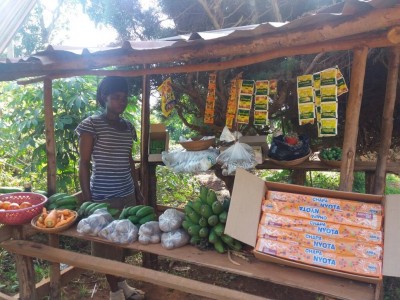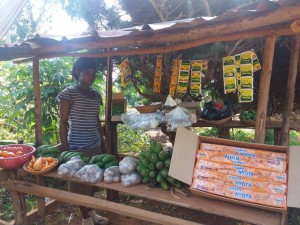Kikondo, UG – Wamukisa starting earn, save, invest, and earn cycle of income generation – 4 Sep 2017
 Wamukisa employees invested part of their savings into opening a small grocery store together. Just two months after they started the store they are seeing both financial and educational returns on their investment.
Wamukisa employees invested part of their savings into opening a small grocery store together. Just two months after they started the store they are seeing both financial and educational returns on their investment.
The idea to open a small grocery came to the three team mates as they were discussing business opportunities that would build on their existing assets and schedule. “We thought that since people come to our farm anyway to buy some small vegetables, why don’t we also sell salt and oil to cook those vegetables?” explained Wamukisa manager Michael Kiwanuka.
“We also know that we do not sell every crop people might want, but if you are coming and buying vegetables you might also want some potatoes. We can purchase potatoes at one of our nearby markets and then someone can buy everything they need from us.”
The team started the grocery store using money they saved from their jobs at Wamukisa. They were inspired to begin saving after discussing with Better Lives how financial security can be built through a cycle of earn, save, invest, and earn. They were already earning with Wamukisa, so saving was the next step. The grocery store represents the third step: investing.
Each of them invested 80,000 UGS (US $24.24) for a total of 240,000 UGS (US $72.73). This money was used to build the grocery stall and purchase inventory. Kiwanuka and his team applied the concept of small sustainable steps when purchasing their inventory in order to maintain flexibility. Kiwanuka has set a goal of having no inventory in the store overnight. He wants to sell everything they purchase each day. Even though this is not the most efficient way to manage inventory in the long-run, Kiwanuka explains that it has helped them stay flexible and learn early on.
“Early on we thought people may be interested in home supplies like soap. But we learned that really from our grocery people just want to buy food. So we very thankfully we had not bought too much soap. We eventually sold all of it and we now focus on food-stuffs only.
“We are also learning what crops people like. So far we have seen irish potatoes and red amaranth having very high demand with our local families. So now we are looking to see how we can grow these crops on our farm to sell and also teach families to grow these crops.”
In addition to learning – which Wamukisa hopes will increase income at their farm in the future – having the grocery is having an immediate financial impact on the farm. The grocery stall brings more people to the farm and this increases demand for the crops Wamukisa is already growing. In the first month the store was open Wamukisa’s commercial vegetable garden sales increased from an average of roughly 100,000 UGS (US $33.00) per month to nearly 146,000 UGS (US $44.24). The store also earned an additional net income of 240,000 UGS from products that were not grown at the farm.
Kiwanuka hopes this means Wamukisa is starting the fourth step in the earn, save, invest, and earn cycle of income generation. If this promising start proves sustainable the team will begin considering how they can save the money they are earning at the grocery for future investments.

